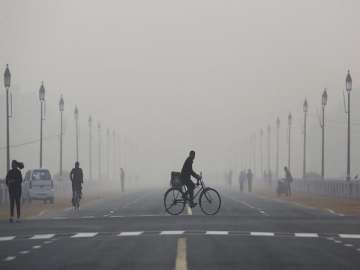People residing in the national capital woke up to a hazy morning on Friday as the region's Air Quality Index (AQI) was rated as 'Very Poor' at 342 by the System of Air Quality and Weather Forecasting and Research (SAFAR).
According to AQI monitoring service, PM 2.5 reading at Punjabi Bagh at 6 AM was 429 - exponentially higher than the safe limit of 60 stipulated by the World Health Organisation. Most other areas like RK Puram, Siri Fort, Jawaharlal Nehru Stadium and Mandir Marg fared almost as badly with PM 2.5 levels between 200 and 330. Shockingly, Mundka area registered PM 2.5 levels at an absolutely alarming 697 at 7 AM.
The AQI between 0 to 50 is considered good, 51 and 100 falls under the category of 'satisfactory', 101-200 is marked as 'moderate', 201 to 300 'poor', 301 to 400 'very poor' and 500 and beyond is considered 'severe'.
The organisation has predicted that the air quality of Delhi will continue to remain in the 'very poor' category for the next three days.
The air quality over the city has been steadily deteriorating in recent days and a respite may not be in the offing any time in the near future. Pollution levels had sky-rocketed last year after Diwali but this year, it has risen exponentially almost two weeks before the festival. One of the major reasons for the polluted air is the raging fire at Bhalswa landfill site while environmentalists also blame burning of stubble in neighbouring states and existing weather pattern for the toxic air over Delhi.
In its advisory, SAFAR has urged the people living in the polluted cities to wea masks. It has also advised people to avoid all physical activity outdoors.
The capital city recorded an AQI at 331 on Thursday.
Faridabad, Noida, Greater Noida, Ghaziabad and Gurgaon had also recorded air quality in the 'very poor' category Thursday, according to CPCB data.
The air quality in the capital had shown signs of improvement Monday as it moved from 'very poor' to 'poor' category. However, it dipped to 'very poor' again Wednesday even as firefighting continued at Bhalswa landfill site in north-west Delhi.
A Delhi Fire Service official said Friday that a fire tender was stationed at the landfill site as parts of the dump site was still smouldering.
Fire had raged at the landfill site on October 20. However, by Tuesday evening, the flames were somewhat brought under control, DFS officials had said.
Meanwhile, the South Delhi Municipal Corporation on Thursday decided to intensify work on stopping incidents of waste and leaves burning by conducting night patrolling in all four zones of SDMC.
Latest India News

